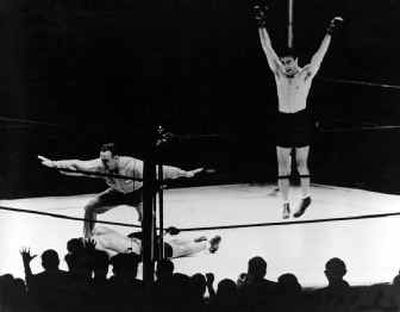Schmeling dies at 99

BERLIN – Max Schmeling wanted to be a heavyweight champion, not a symbol of Nazi supremacy.
Though he thrilled Germany by knocking out Joe Louis, there was another side to the boxer Hitler tried to portray as an Aryan Superman.
Schmeling, who fought Louis in two of the most politically charged sporting events on the eve of World War II, once hid two Jewish boys in his apartment from marauding Nazis and later reportedly helped some Jewish friends escape death camps.
He said he feared one thing in a long life that ended Wednesday at age 99.
“I don’t want anyone to say I was a good athlete, but worth nothing as a human being – I couldn’t bear that,” Schmeling said in 1993.
The German had nothing to fear in the end. Tributes poured in across his homeland, where he remained a huge idol renown for his generosity long after his fights with Louis sparked a propaganda war between the Nazi regime and the United States.
German President Horst Koehler, on a state visit to Israel, lauded Schmeling as a “great example in sport” and for “his humanity.”
Over the years, Schmeling gave hundreds of thousands to help the elderly and poor through the Max Schmeling Foundation. He treasured his friendship with Louis and quietly gave the down-and-out American gifts of money. He also paid for Louis’ funeral in 1981.
Schmeling was buried Friday next to his wife, Anny Ondra, in Hollenstedt at a ceremony attended by a small circle of friends. Pastor Olaf Koenitz said it was Schmeling’s wish to be buried privately.
Schmeling’s extraordinary career will be remembered for his bouts with Louis, which produced a lasting bond between the boxers despite a charged atmosphere when they fought.
Born Sept. 28, 1905, of humble origins in a small town in the state of Brandenburg, Schmeling became interested in boxing after seeing a film about the sport.
He became the first German – and European – heavyweight world champion when he beat Jack Sharkey in New York on June 12, 1930, after the American was disqualified for a fourth-round low blow. He was the only German to be world heavyweight champion.
Schmeling lost his title to Sharkey two years later on a disputed decision, but came back to knock out the previously unbeaten Louis in the 12th round on June 19, 1936, which the Nazi regime trumpeted as a sign of “Aryan supremacy.”
Schmeling was a 10-1 underdog and his victory is considered one of the biggest upsets in boxing history. But in a rematch at Yankee Stadium on June 22, 1938, Louis knocked out Schmeling in the first round.
The fight was a huge event world wide and left a lasting impression on his era of Germans, who followed blow-by-blow on radio.
At first, Schmeling was popular in the United States. But by the time the rematch with Louis took place, he was viewed as a symbol of the Nazis.
The fight was portrayed in both countries as good vs. evil. President Franklin D. Roosevelt invited Louis to the White House to exhort the black boxer to beat Schmeling.
Louis, then the champion, sent the German challenger to the canvas four times and knocked him out in 2 minutes, 4 seconds of the first round.
“Looking back, I’m almost happy I lost that fight,” Schmeling said in 1975. “Just imagine if I would have come back to Germany with a victory. I had nothing to do with the Nazis, but they would have given me a medal. After the war I might have been considered a war criminal.”
After the loss, the Nazis distanced themselves from Schmeling. In 1940, he was drafted into the military as a parachutist. He was severely injured and hospitalized for months in 1941.
Although he had lunched with Hitler and had long discussions with propaganda minister Joseph Goebbels, Schmeling angered the Nazi bosses in 1935 by refusing to join the Nazi party, fire his Jewish-American manager, Joe Jacobs, and divorce Ondra, a Czech-born film star.
During the 1936 Berlin Olympics, Schmeling extracted a promise from Hitler that all U.S. athletes would be protected. He hid two Jewish boys in his Berlin apartment during Kristallnacht in 1938, when the Nazis burned books in a central square and rampaged through the city, setting synagogues on fire. He reportedly used his influence to save Jewish friends from concentration camps.
After the war, Schmeling was nearly destitute and fought five more times for the money. He retired after a 10-round loss to Walter Neusel in 1948 at 43 with a record of 56-10-4.
Schmeling used the money from the bouts to buy the license to the Coca-Cola franchise in Germany and grew wealthy in the postwar era.
In his final years, Schmeling spent three or four hours a day watching television in his home in Hollenstedt. He remained married to Ondra for 54 years until she died in 1987.